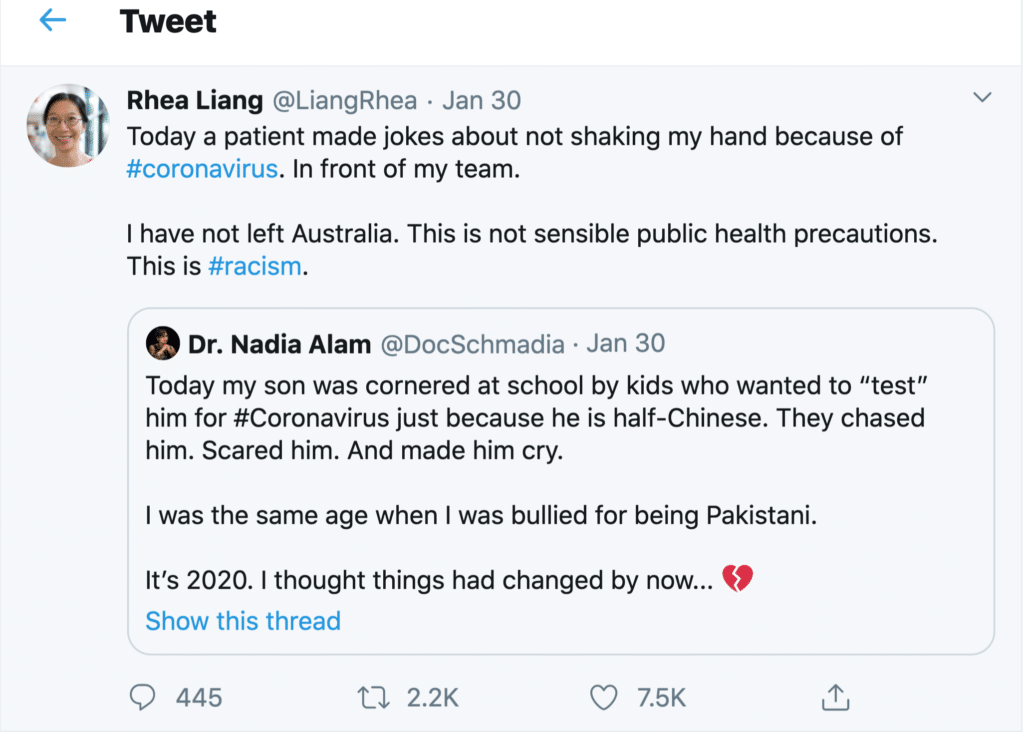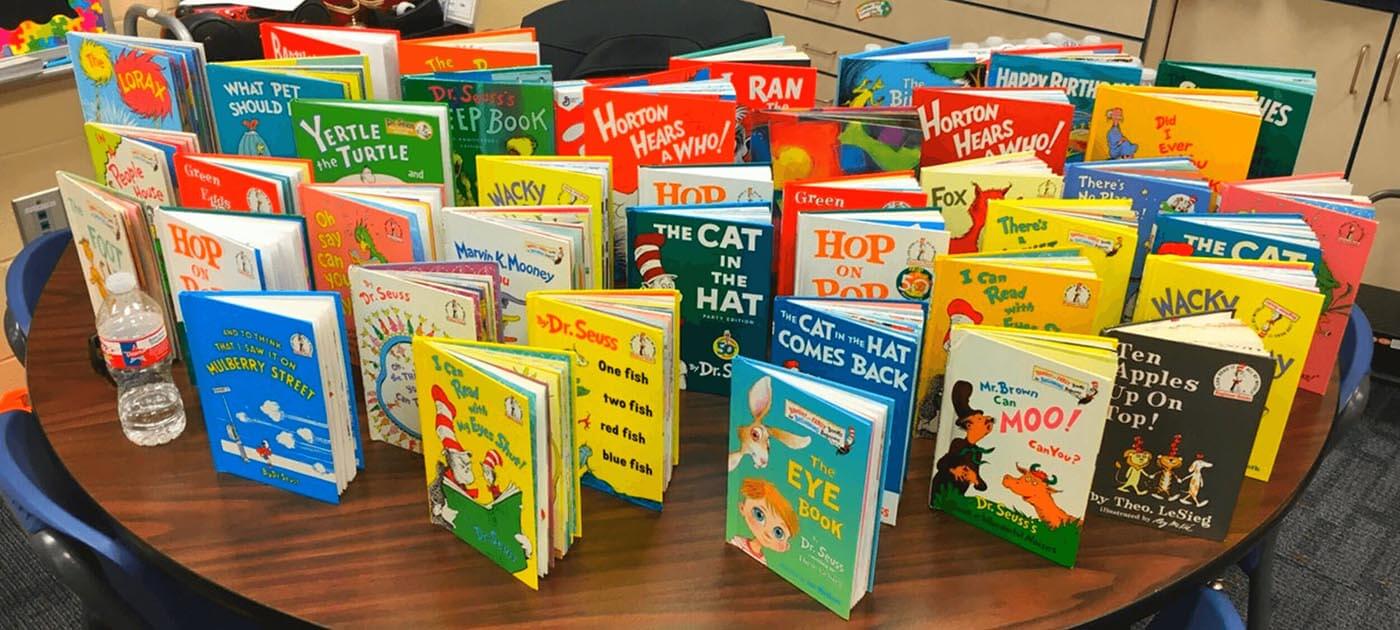
CoronaVirus reveals our sinophobic underbelly
Opinion + AnalysisHealth + WellbeingPolitics + Human RightsRelationships
BY Simon Longstaff The Ethics Centre 6 MAR 2020
A virus knows no race. It is indifferent to your religion, your culture and your politics. All a virus ‘cares about’ is your biology … For that, one human is as good as any other.
Despite this, it’s easy enough to find recent reports of Australians experiencing discrimination for no reason other than their Chinese family heritage.
Such attacks are examples of racism – the irrational belief that an individual or group possesses intrinsic characteristics that justify acts of discrimination. That this is occurring is not in doubt.
For example, Australia’s Chief Medical Officer, Professor Brendan Murphy has seen enough of such behaviour to make explicit reference to the phenomena, labelling xenophobia and racial profiling as “completely abhorrent”.
Professor Murphy’s position is one of principle. However, there is also a practical aspect to his admonition. Managing the risks of an outbreak of a pathogen like the novel coronavirus COVID-19 requires health officials and the wider community to make rational choices based on an accurate assessment of risk. Racism is irrational. It distorts judgement and draws attention away from where the risks really lie. Ethically it is wrong. Medically, it is idiotic and dangerous.
This rise in racism, prompted by the emergence of COVID-19, reveals how thin the veneer of decency is that keeps latent racist tendencies in check. It seems that, given half-a-chance, the mangy old dog of Sinophobia is ready to raise its head, no matter how long it has laid low.
Of course there is nothing new about Sinophobia in Australia. Fear of the ‘yellow peril’ is woven through the whole of Australia’s still-unfolding colonial history. Many factors have stoked this fear, including: persistent doubts about the legitimacy of British occupation of an already settled continent, ignorance of (and indifference to) Chinese history and culture, the European cultural chauvinism that such ignorance fosters, the belief that numerical supremacy is, ultimately, a determining force in history, the need to find scapegoats when the dominant culture falters, and so on.
Whatever the historical cause of this persistent fear, the present ‘trigger’ is the inexorable rise of China as an economic and military super power – a power that is increasingly inclined to demand (rather than earn) deference and respect.
The situation is made more volatile by the growing tendency for the China of President Xi Jinping to link its power and success to what is uniquely ‘Chinese’ about its history and character. Add to this a broadly accepted Chinese cultural preference for harmony and order and the nation is often presented as if it is a ‘monolithic whole’ – not just in terms of its autocratic government but in its essential character.
Unfortunately, all of this feeds the beast of racist prejudice. Those who feel threatened by the changing currents of history seize on even the flimsiest threads of difference and use these to weave a narrative of ‘us’ and ‘them’ – in which others are presented as being essentially and irremediably different. This is the racists’ central trope – that difference is more than skin deep! Biology makes you one of ‘us’ or you are not.
It’s nonsense. Yet, it’s a nonsense that sticks in some quarters, especially during times of uncertainty such as this; when the general public is feeling betrayed by the elites, when institutions have lost trust and have weakened legitimacy and when increasing numbers of people fear for their future and that of their families.
Unfortunately, tough times provide fertile ground for politicians who are willing to derive electoral dividends by practising the politics of exclusion. It is a cheap but effective form of politics in which people define their shared identity in terms of who is kept outside the group.
It is far harder to practise the politics of inclusion – in which disparate groups find a common identity in the things they hold in common. This too can work, but it takes great energy and superior skills of leadership to achieve this outcome. Yet, it is the latter approach that Australia must look for, if only as a matter of national self-interest.
This is because racist attacks against Australians of Chinese descent also have a significant national security dimension. As I have written elsewhere, social cohesion is a vital component of a nation’s ‘soft power’ when defending against foes who covertly seek to ‘divide and conquer’.
The risk of such attacks is increasing as the world drifts back to a pre-Westphalian strategic environment in which the international, rules-based order breaks down and nations freely interfere with the domestic affairs of their rivals. In these circumstances, the last thing Australia needs is deepening divisions based on spurious beliefs about supposed racial deliveries.
Those who create or exploit those divisions wound the body politic, weaken our defences and undermine the public interest.
All of that said, it is important not to overstate the dimensions of the problem. Australia is a notable successful multicultural nation where harmonious relations prevail. This is despite there being an undercurrent of racism that has been more or less visible throughout Australia’s modern history.
Racism is never justified. Not by the fact that it is found to the same degree in other societies, and not even when its manifestation is rare. Although it offers little comfort, it should also be acknowledged that discrimination is as much a product of other forms of prejudice concerning religion, gender, culture, etc.
We have the capacity to do and be better. This is a choice we can and should make for the sake of our fellow citizens – whatever their background – and in the interests of the nation as a whole.
So, given that China is not likely to take a backwards step and Australians of Chinese background cannot (and should not) disguise their heritage, how should we respond to the latest bout of Sinophobia?
Attack prejudice with fact
A first step should be to follow the example of Australia’s Chief Medical Officer and attack prejudice with the facts. Professor Murphy’s example showed how facts about medicine can be deployed to calm fears and neutralise racist myths. This approach should be extended to other areas. For example, more should be known of the long history and extraordinary contribution of Australians of Chinese heritage.
This account should not merely tell the story of elite performance, economic contribution, etc. It should also speak of those who have fought in Australia’s wars, built its infrastructure, educated its children, nursed its sick … and so on. In short, we need to see more of the extraordinary in the ordinary.
Reframe the narrative
Second, we need to reframe the narrative about China and the Chinese. Today, most commentary portrays China as both a security threat and an economic enabler. It is both. However, this is only a small part of the story.
For the most part, we see little of the life of the Chinese people. We are largely ignorant of the achievements of their remarkable civilisation. One might think that the closeness of the economic relationship might be a positive factor. However, regular reporting about Australia’s economic dependence on China, is not helping the situation.
I know that this will seem counter-intuitive to some. However, the more we speak of Chinese students propping up our universities, of Chinese tourists sustaining our tourism industry and of Chinese consumers boosting our agricultural exports … the more it makes it sound as if the Chinese are little more than an economically essential ‘necessary evil’ – a ‘commodity’ that comes and goes in bulk.
This view of the Chinese negatively influences attitudes towards Australia’s own citizens of Chinese descent. Fortunately, a solution to the ‘commodification’ of the Chinese is at hand, if only we wish to embrace it. The large number of Chinese students who study in Australia offer an opportunity to build better understanding and stronger relationships.
Unfortunately, the Chinese student experience in Australia is reported not to be as positive as it should be. Too many arrive without the English language skills to engage more widely with the community. Too many find themselves lonely and isolated. Too many find solace in sticking with those they know and understand. With some justification, large numbers feel as if they are little more than a ‘cash cow’.
Invest in ethical infrastructure
Third, we need to invest in Australia’s own ‘ethical infrastructure’ – much of which is damaged or broken. We need to repair our institutions so that they act with integrity and merit the trust of the wider community. We need to work on the core values and principles that underpin social cohesion.
Part of this task must be to come to terms with the truth about the colonisation of Australia. This is not to invoke the ‘black arm band’ view of history. The truth is both good and bad. However, whatever its character, our truth remains untold. I sincerely believe that Australia’s ‘soft power’ is weaker than it would otherwise be, if only we could address this unfinished business.
Alleviate fear
Fourth and finally, the measures outlined above will be ineffective unless we also name the latent fears of average Australians. People across the nation want these ‘bread and butter’ issues to be acknowledged and addressed:
- How safe is my job?
- If I lose my current job, will I find another?
- If I can’t find another job, how will I pay my bills?
- Will I be cared for if I get sick?
- Will my children get an education that equips them to live a good life in the future?
- Can I move about with relative ease and efficiency?
- How will the nation feed itself?
- Are we safe from attack?
- Who can step in cases of natural disaster or man-made calamity?
- Why are our leaders not held to account when we are?
- Why can’t I be left alone to do as I please?
- Who cares about me and those I care about?
Failure to speak to the truth of these deep concerns leaves the field wide open for the lies of those who would stoke the fires of racism.
Unravel the complexities of the political relationship between China and Australia at ‘The Truth About China’, a panel conversation at The Festival of Dangerous Ideas, Saturday 4 April. Tickets on sale now
Ethics in your inbox.
Get the latest inspiration, intelligence, events & more.
By signing up you agree to our privacy policy
You might be interested in…
Opinion + Analysis
Relationships
Ethical dilemma: how important is the truth?
Opinion + Analysis
Climate + Environment, Relationships
You can’t save the planet. But Dr. Seuss and your kids can.
Opinion + Analysis
Relationships
Big Thinker: Baruch Spinoza
Opinion + Analysis
Relationships





